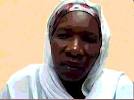A Press Release from Amnesty International & Human Rights Watch
Sudanese Authorities Must End Violent Crackdown on Protesters, End Impunity for Abuses
Contact: Suzanne Trimel,
strimel@aiusa.org, 212-633-4150,
@strimel(New York) -- Amnesty International and Human Rights Watch called on Sudanese authorities today to immediately release people arrested for participating in recent peaceful protests and demanded that torture and ill-treatment of detained protesters stop.
Sudanese groups monitoring the arrests estimate that since June the Sudanese security forces have detained 2,000 people in connection with the youth-led protests in Khartoum and other major towns across Sudan.
"Torture and other ill-treatment are absolutely prohibited under international law," said Aster van Kregten, Amnesty International's deputy director for Africa. "We call on the Sudanese authorities to ensure that every credible allegation of such abuse is subject to prompt and impartial investigations, and to ensure that the victims receive reparations."
While 2,000 detained is difficult to confirm, reports indicate that at least 100 people remain in detention in Khartoum alone. The majority are being held in National Security Services (NSS) detention centers, which are well-known for the
use of ill-treatment and torture.
In one of the latest crackdowns on protesters, on July 6 security forces used excessive force against a demonstration in the Sayyid Abdelrahman mosque, in the Wad Nubawi neighborhood of Omdurman, a suburb of Khartoum.
A 26-yr-old student present at the protest said he was hit with rubber bullets in both legs. "When we got out, we saw the police outside the mosque," he told Amnesty International. "So we started chanting 'Peaceful! Peaceful' and sat on the ground to show them we didn't want confrontation, but they walked toward us and fired rubber bullets and tear gas at us, and chased us inside the mosque."
In recent days, demonstrators have also reported being attacked by pro-government students wielding sticks, knives and axes. Injured protesters are afraid to seek medical care. A security guard at the Omdurman Hospital told Amnesty International that he witnessed NSS agents arresting wounded protesters immediately after they were discharged.
Since the protests began on June 16, Sudanese security forces have repeatedly
used excessive force to disperse the demonstrations and
arrested scores of peaceful protesters including students, youth activists, and journalists.
Security officials have also separately arrested and detained activists, journalists, lawyers, doctors, and members of youth groups and opposition parties not directly connected to the protests.
Many detainees have been released after hours or days, often after signing a statement renouncing any political activities or participation in the protests. Other individuals are detained for longer periods and face lengthy interrogations in which they are accused of being traitors, Communists, or spies; several have reported harsh treatment, including beatings and sleep-deprivation.
Among those still detained are Nahid Jabralla, the head of SEEMA, a women's and children's rights group, arrested on July 3; US resident Rudwan Daoud, a member of youth movement Girifna ("We're fed up") who was arrested on July 3 with his father and brother; Ussamah Mohammed, arrested on June 22, who has openly criticized the government on Al Jazeera; Khaled Bahar, an activist with the Haq movement, who has been detained since 20 June; Yassir Fathi, a member of the opposition Umma party, who was arrested on 21 June; and Amira Osman, a member of the Communist party, in detention since 28 June . They are all at risk of torture or other forms of ill-treatment; Daoud appears to have been beaten, according to witnesses who saw him appear in court earlier this week.
Those released from security detention are often afraid to report their ordeal to organizations or journalists. Amnesty International and Human Rights Watch interviewed more than 13 former detainees who reported beatings, verbal insults, food, water and sleep deprivation and other ill-treatment while in detention in Khartoum and its suburbs since mid-June.
A 38-yr-old doctor who was arrested on June 28 and detained for a day told Amnesty International that an officer from the NSS bashed his forehead against the wall on two occasions. Later, he was surrounded by eight NSS officials who slapped him and punched him in the face repeatedly.
Security officials also beat and verbally insulted his three sisters, who were arrested the previous week for participating in a demonstration in the al-Riyadh area of Khartoum, he said. The security officials kicked and beat the women with their feet and with sticks until two of them bled. One security official dragged one of the women on the floor, causing injury to her face. NSS agents called them "prostitutes."
Another former detainee, Darfuri student Issam al-Din Mohammed Ibrahim, said 10 plain-clothed security agents and uniformed police officers beat him repeatedly using their fists, wooden sticks, water hoses and iron bars.
On June 18, police and plainclothes security agents arrested him while he was participating in a protest and transferred him to a building near the Jackson bus station in Khartoum where the arrest took place. He told Amnesty International: "They began to beat me, beat me, beat me severely on all parts of my body." The security forces shouted racist abuse at him, he said.
The following day, he was sentenced to a fine of 100 Sudanese pounds by the North Khartoum criminal court, on charges of public nuisance and breaching the public peace, and released. Authorities have
sentenced scores of protesters to fines and lashings for the same charges.
A 24-yr-old student from Sudan University told Human Rights Watch he was also beaten while in NSS detention. He said: "they took me into a room and then the two men started to beat me with black plastic water pipes, slapping me in the face and kicking me in different parts of my body."
Magdi Akasha, a 30-yr-old leader of the Youth for Change movement, was detained by the NSS from June 27 until July 2. He said he was beaten with sticks, made to sit all day under the scorching sun, and denied sleep while in detention.
Najlaa Sid Ahmad, an activist with Girifna and a video blogger, was summoned to NSS offices for 12 hours every day for three days, during which she was denied food and water. On the last day, she suffered from dehydration and hypoglycemia and had to be hospitalized.
The current protest movement broke out when a demonstration in the female dorms of Khartoum University triggered a wider movement protesting economic austerity measures and demanding regime change.
Protests have been taking place on a near-daily basis since mid-June, notably in Khartoum and the neighboring cities of Omdurman and Khartoum North, but also in the cities of al-Obeid, Port Sudan, Atbarah, Dongola, Kassala and Gedaref. In these provincial towns, as in the capital, security forces have been using excessive force against demonstrations and arrested large numbers of protesters and known activists.
Sudanese authorities have also routinely censored newspapers, removing articles about sensitive topics and seizing entire print runs of specific issues; and have harassed and arrested journalists who report on anti-government protests.
Amnesty International is a Nobel Peace Prize-winning grassroots activist organization with more than 3 million supporters, activists and volunteers in more than 150 countries campaigning for human rights worldwide. The organization investigates and exposes abuses, educates and mobilizes the public, and works to protect people wherever justice, freedom, truth and dignity are denied.

















